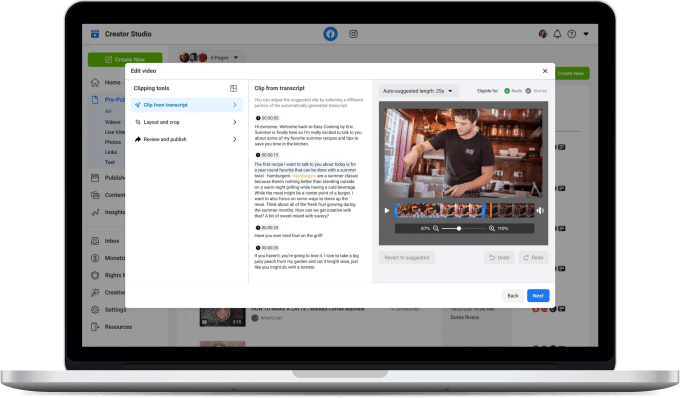As it continues to chase TikTok, Meta today announced a series of updates and new features for its Reels products across both Facebook and Instagram. Most notably, it’s offering a Sound Sync feature on Facebook Reels and adding support for longer Instagram Reels of up to 90 seconds, instead of 60 seconds, previously. The expansion follows TikTok’s move into YouTube territory with videos that can now be 10 minutes, instead of just 3 as before.
The company is also rolling out several more creative tools, audio tools, templates, and other options to make Reels more engaging, as TikTok’s influence — and money-making potential — continues to grow.
For starters, Meta is now leveraging existing features designed for Instagram Stories and bringing them to Reels. Among these are the Poll, Quiz, and Emoji slider stickers commonly found on Instagram Stories. These will become available as Reels features, as well.
While it may make sense to repurpose some of its most popular creative tools for Reels, in doing so, Meta runs the risk of blurring the line between its various products to the point where Reels doesn’t feel all that differentiated from Stories — instead, it could end up seeming more like an extension.
Another new Instagram Reels feature is the ability to import your own audio — an option that would allow users to add commentary or a background sound from any video at least 5 seconds long that’s stored on their Camera Roll.
Plus, Instagram is introducing templates, a new tool that will allow users to create new reels using the same structure as one they just watched. This was spotted in testing back in April and is somewhat similar to TikTok’s own templating option, which is a simpler way to get started with video creation. With Reels Templates, users are able to pull in both the audio and clip sequence, however. This helps users to recreate more complex formats just by adding their own content and trimming their clips.
Image Credits: Meta
Separately, Facebook Reels is gaining a number of new features, as well.
One key addition here is the launch of Sound Sync, a tool that will automatically sync users’ video clips to a favorite track. Syncing video to sounds has been a defining characteristic of TikTok’s short-form video platform, and a technology the company has expanded on over the years with further music-related creative effects, like those including visualizations, animations, and interactivity.
Facebook Reels users will also be able to add voiceovers to their videos, which is already common on TikTok.
A few other features are aimed at appealing to more professional creators, like desktop-based video clipping tools that will make it easier for creators who publish long-form, recorded, or live videos to test out other formats, like Reels. They’ll be able to turn their content into Facebook Reels using Creator Studio, for example. Meanwhile, gaming video creators will gain tools that will let them generate short-form, vertical Reels directly from their Live content, with dual views for both gameplay and the creator cam.
Creators will also now be able to create, edit and schedule their Facebook Reels from the desktop, in addition to iOS and Android.

Image Credits: Meta
Facebook will also push suggested reels in its Feed globally, as well as in Watch and Groups, in an effort to ramp up discovery and help creators obtain broader reach. It reminded creators, too, that Reels are prioritized and ranked based on whether or not they’re featuring original content.
While these changes may help to expand the variety of reels that are produced by creators, what Meta is arguably lacking when it comes to Reels is quality.
Feeds are often dominated by boring or dated trends — like recordings of people trying out AR or beauty filters, or videos synced audio clips that feature random or uninteresting videos uploaded from users’ phones. Pets and uninspired travel video clips are also common on Reels, as is engagement bait, where the sole purpose of the video is to drive users to the comments. Some Reels creators simply pose for the camera but have nothing to say — a tactic that may have helped them build a following when Instagram was a photo-centric app that rewarded the attractive, but is less of a draw in the TikTok era, where users are demanding authenticity, not perfection.
Despite these issues, creators can still — for now, at least — rely on Facebook and Instagram’s massive reach of billions to garner attention and engagement. But the overall feel of browsing Reels remains quite different from TikTok. On the latter, commentary, insights, vlogs, and serendipitous, but highly personalized discovery continues to reign.
To address this larger issue, Meta has been paying creators directly to make Reels through its creator fund and recently announced that it will pay out bonuses to creators for original content, too. But some are beginning to suspect TikTok’s rise combined with Meta’s hampered ability to acquire competitors under increased regulatory oversight will put an end to Meta’s time at the top as the leading social platform.

